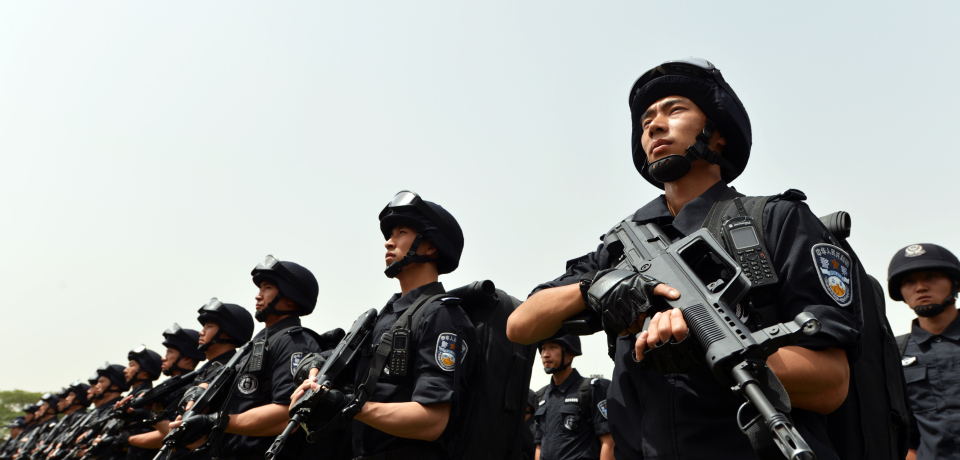Chinese authorities have for the past 20 months been engaged in a controversial crackdown on terrorism that some fear is serving to exacerbate tensions in the troubled region of Xinjiang, home to a majority population of ethnic Uyghurs. At The New York Times, Andrew Jacobs reports on mounting agitation among the Uyghur population in response to increased restrictions and detentions:
A recent 10-day journey across the Xinjiang region in the far west of China revealed a society seething with anger and trepidation as the government, alarmed by a slow-boil insurgency that has claimed hundreds of lives, has introduced unprecedented measures aimed at shaping the behavior and beliefs of China’s 10 million Uighurs, a Turkic-speaking Muslim minority that considers this region its homeland.
[…] As heavily armed soldiers rummage through car trunks and examine ID cards, ethnic Uighur motorists and their passengers are sometimes asked to hand over their cellphones so that the police can search them for content or software deemed a threat to public security.
[…] “All of us have become terror suspects,” said a 23-year-old Uighur engineering student who said he was detained overnight in November after the police found messages he had exchanged with a friend in Turkey. “These days, even receiving phone calls from overseas is enough to warrant a visit from state security.”
[…] “The state’s ability to penetrate Uighur society has become increasingly sophisticated and intrusive,” said James Leibold, an expert on China’s ethnic politics at La Trobe University in Melbourne, Australia. “But while these new measures allow the party to nip a lot of problems in the bud, they also foster new forms of alienation and violence that ultimately weaken the party’s legitimacy and rule.” […] [Source]
While the Times’ investigations found increasing “anger and trepidation” as restrictions continue in Xinjiang, a top Party official recently remarked that government efforts have been largely successful in rooting out radicalism and “maintaining stability.” Reuters’ Ben Blanchard reports:
In a New Year’s address carried in the Xinjiang Daily, the region’s Communist Party boss, Zhang Chunxian, said that in 2015 the government deepened its “de-radicalization” efforts.
“The atmosphere for religious extremism has weakened markedly,” Zhang said, without elaborating.
[…] Zhang said the authorities had also maintained “high pressure” on beating back militants in the past year.
“Social management and stability maintenance abilities continued to improve, and society generally remained stable,” he said. [Source]
In addition to enacting restrictions that overwhelmingly affect Uyghurs in Xinjiang, China has been known to target critical Uyghur voices abroad by exerting pressure on their China-based family members. Three brothers of U.S.-based Uyghur journalist Shohret Hoshur were detained in 2014, and went on trial in August 2015. The New York Times’ Michael Forsythe reported last week that two of the brothers had been released for unknown reasons prior to receiving a verdict, while the third is serving a five-year sentence for endangering state security. In the most recent installment of Reuters’ “Long Arm of China” investigative series, Paul Mooney and David Lague report on other government harassment and intelligence gathering efforts aimed at overseas Uyghurs:
China’s suppression of political dissidents and restive minorities at home is well known. Less documented are Beijing’s extensive and growing efforts to stifle these same populations abroad, including Chinese-born citizens of Western democracies. This examination of China’s methods of exerting control over Uighur exiles in North America, Europe and Australia is based on interviews with exiled Uighur leaders, court records of espionage trials and the findings of asylum cases.
In Germany and Sweden, Chinese spies – some Uighurs themselves – have been convicted of espionage against local Uighur communities. Relatives of exiled Uighur leaders in the United States and Canada have been jailed back in Xinjiang. One prominent Uighur leader said he has been detained or denied entry on traveling to some Western countries after China accused him of terrorism.
“Some might think that once you flee China, you are free,” said Kayum Masimov, president of the Uyghur Canadian Society. “But you are never free.”
[…] Ultimately, Uighur activists say, the goal of China’s global dragnet is less the collection of high quality intelligence and more an effort to intimidate the exile community. Prominent Uighurs say China’s infiltration of their ranks is even more successful than its penetration of Tibetan exile groups critical of Beijing’s policies in Tibet. […] [Source]
Amid the ongoing domestic crackdown on terrorism, Beijing last month passed an expansive anti-terrorism law. Previous drafts of the law had been criticized by activists for having the potential to erode religious, ethnic, and political rights; by foreign diplomats and companies for data disclosure requirements; and by legal scholars for an overly broad definition of terrorism. The newest draft became law on December 27, and many of the initial concerns echoed. At the BBC, the Royal United Services Institute’s Raffaello Pantucci looks at the new Chinese legislation to determine that in regard to the situation in Xinjiang, it does little to address the underlying issues that contribute to domestic incidents of violence:
In many ways, the attack [in Bangkok, which was linked to the Thai government’s repatriation of Uyghur refugees] was an extension of China’s domestic terrorist problem. The Uighur anger that initially mostly prompted attacks against the state in Xinjiang slowly spread around China (including prominent incidents in Beijing and Kunming) and now could be found abroad.
The problem is that, while it is clear the new legislation tries to deal with the mechanics of these issues – by establishing frameworks through which people can be detained and pursued abroad – it is not clear that it deals with the underlying anger behind the terror.
[…] If China wants to be able to properly and effectively tackle its terrorism problems at home and abroad, it needs […] to find a way to not only disrupt terror networks but to understand why people are drawn to terror in the first place and how it can address the issue. [Source]








